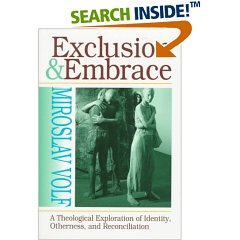Allergies... the ugliness of 'sneezing man'

I'm in Bellingham for a couple of days, and it's the end of March. In my life, those two realities invariably spawn a third reality: allergies. Bellingham, one of my favortie places, is beautiful precisely because they've gone to great lengths to preserve wetlands and streams within the city. But those wetlands are home to plenty of Alder trees, and Alder pollen is the source of my allergies. For reasons known only to God, my body thinks Alder pollen is some sort of toxic enemy that needs to be expelled, and so every breath I take in this place, at this time of year, creates a panic reaction from my immune system. Histamines flood my nasal passages, and soon I'm sneezing and wheezing, even with Allegra running through my veins to tame the whole ugly scene.
When human bodies fire off alarms needlessly because of an overactive immune system, we call that an allergic reaction. It's a dysfunction, and though more annoying than dangerous, the victim is frankly not much fun to be around during a sneezing bout.
Can I suggest that the body of Christ is also not much fun to be around when it has an overactive immune system? Down through the ages, the church has identified numerous threats to her health: sex on Sundays, music with a beat, jazz, a fine merlot, speaking in tongues, not speaking in tongues, Harry Potter, post-modernism, frescos with nudity (what? you haven't heard of Daniel the Trouserer who, during the Victorian era, was hired by the Pope to graffiti various frescos in chapels by painting pants on the nudes!), Democrats, Republicans, red meat on Fridays, etc. etc. etc. With a ferocity known only to religious people, they've gone after the invaders, and expelled them, protecting the 'purity' of the body. But the sneezing that's ensued can only be called an ugly blight - who wants to be around a body in the midst of an allergy attack?
Meanwhile, though various parts of this glorious but troubled body are busy sneezing out the 'heretics', that same body is passively allowing other things to enter in and make a home. Consumerism, a low view of marriage and sexuality, loss of covenant relationships, neglect of the poor, and disregard for the environment all seem to find their way in to various parts of the body. The combination of an overactive and underactive immune system at the same time could be deadly - in fact, some think that it is.
There are at least two actions needed if our immune system is to recover:
1. We need to understand our main responsibility: What does the Lord require of you, but to do justice, love mercy, and walk humbly with your God. If I start there and stay there, my immune system has little chance of getting too wacky.
2. We need to wrestle with the ethics of the gospel. Richard Hayes book would be helpful here, and I think this fall, it's time once again for an ethics class, so that we can focus on the real diseases, and ignore the pollen.
I can sneeze for a few hours, and then it starts to rain, and the pollen settles down. But these problems in the church aren't going to go away with intentional effort, concentrated prayer, and collective repentance and renewal. Who's ready to help fine tune the immune system of Christ's body? He's so unpleasant when he's sneezing all the time!








